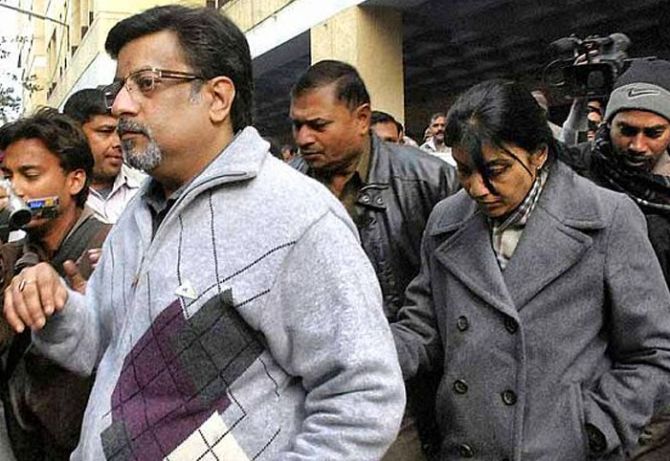The fruitless pursuit, which tore the Talwars' lives and reputations to shreds, means that Aarushi's killers have not only got away but may never be found, says Sunil Sethi.

Collectively the nation exhaled a sigh of relief at the acquittal of Rajesh and Nupur Talwar for the murders of their 14-year-old daughter Aarushi and domestic Hemraj, the crimes they never committed in May 2008.
The Allahabad high court's 273-page judgment is a remarkable document.
Dense and devoid of digression, it is a detailed forensic examination of the evidence on record.
It is also one of the harshest indictments of the CBI's dirty tricks that put the Talwars through a horrendous nine-year ordeal, four in the grim environs of Dasna jail, Ghaziabad.
To quote just one operative line: '...There is not even an iota of evidence on record even remotely suggesting either Hemraj was assaulted in Aarushi's bedroom or of any sexual activity between the deceased.'
Shortly after being imprisoned for life in November 2013, Rajesh Talwar started a jail diary, some pages of which were published in journalist Avirook Sen's bestselling account Aarushi (Penguin, 2015; Rs 299).
'We are destroyed,' wrote the agonised father. 'We were destroyed by Aaru's loss and he (Shyam Lal, the CBI's trial judge who convicted them) has completely destroyed us by this kind of verdict.'
If Mr Sen's book, prophetic in hindsight, raised the bar in investigative journalism, Justices B K Narayana and A K Mishra, who have destroyed the CBI's prosecution case, may have opened a new chapter in criminal jurisprudence.
The CBI is now decisively in the dock. It stands accused of an appalling line-up of misdemeanours from suppressing and fabricating evidence, tutoring witnesses, falsifying forensic analysis and much else, chiefly the handiwork of the late A G L Kaul, the CBI's investigating officer who zipped round the country, hell bent on obtaining the Talwars' conviction by doctoring records.
This fruitless pursuit, which tore the Talwars' life and reputation to shreds, means that Aarushi's killers have not only got away but may never be found; the case that shook middle-class India to its core, and let loose the baying bloodhounds of the media to spin the most luridly prurient of yarns, will go down in the annals of the CBI as yet another unsolved -- and insolvable -- crime.
Rebecca Mammen John, a member of the Talwars' legal team and who fought their case pro bono for many years, regards the verdict as "a great personal victory", but points out that the defence arguing their innocence was "consistent throughout, it was the CBI's prosecutors that kept shifting their stand".
The key point to remember about the Aarushi case, as of countless others, is that it was a crime against the State; and that the CBI, as prosecuting agency, is funded by taxpayers' money.
It, therefore, involves us all -- in effect we have paid to tyrannise the Talwars, and accuse them of murdering their daughter for alleged carnal relations.
As Avirook Sen says, 'It was a case of collective suspension of rationality, of the courts, the media, and of us as consumers and supplicants to an entire system.'
We, too, have paid for CBI Judge Shyam Lal of the Ghaziabad court, whose much derided judgment of November 2013 that condemned the Talwars is a travesty of legal and linguistic balance.
With its crude references to Aarushi as 'a beaut (em>sic) damsel and sole heiress' and synonyms for penis (Hemraj's 'willy was turgid'; his 'pecker was swollen') it abounds in solecisms such as 'to repeat at the cost of repetition'. (Judge Shyam Lal, in violation of the judicial code, employed his son to help write the judgment.)
An important question arises in the aftermath of the Allahabad acquittal: In its moment of abject humiliation what will the CBI do?
Given the profile of the case and its tortuous unravelling, its choices are limited. The high court judgment leaves little room for appeal, but it has the right to approach the apex court, though the action may be fraught with risk.
Or it can hold an internal, even a public inquiry, and punish investigators for their trail of calumny and cover-ups.
And there could be a third option, tried in the West, but not tested strongly enough in public interest litigation in India. A collective body of the tax-paying public can sue the CBI and hold it accountable.
Because the bottom line is this: If a case as sensational as the Aarushi and Hemraj murders, which gripped the public imagination, is proven to be a monumental miscarriage of justice, then what of the grievous harm and condemned lives of the numberless poor in jails, doubly victimised, accused of crimes they may never have committed but destroyed by prosecution agencies of the State?











